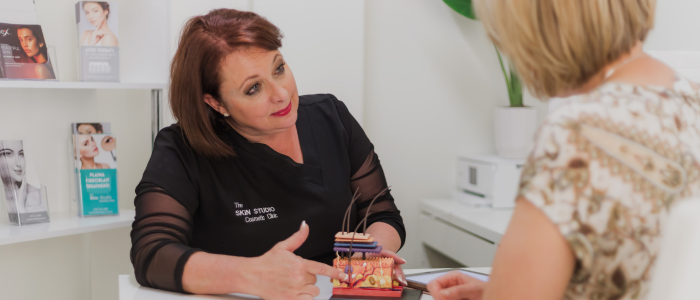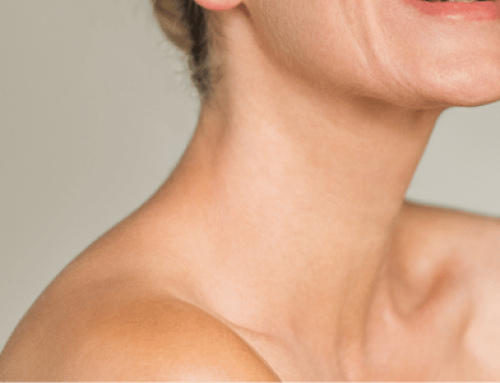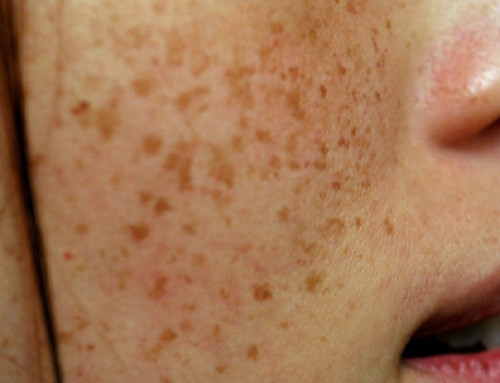How Does Menopause Affect The Skin?
Menopause is a significant phase in a woman’s life and the various hormonal changes profoundly affect the skin.
Often women attribute changes in the skin as the normal part of ageing. But in our skin clinic we often hear “it feels like I got 10 years older overnight.”
We celebrate the end to monthly periods, but common side effects like hot flushes, night sweats, fatigue, anxiety and low libido can be debilitating.
This article focuses on the potential skin changes during the phases of menopause and every journey is different.
The Primary Cause of Skin Changes in Menopause.
According to Jeanine Downie, MD, a woman ages the most rapidly between the ages of 41 and 47 years old, the common period of peri-menopause.
Menopause (meaning 12 months without a period) typically occurs between the ages of 45 and 55.
As a woman enters peri-menopause, the body undergoes a decline in the production of Oestrogen and Progesterone, two key hormones that play a crucial role in skin health.
Oestrogen deficiency has a wide range and dramatic effect on the skin, that continues indefinitely through post-menopause.
Studies show that women’s skin loses about 30% of its collagen during the first five years of menopause.
After that, women lose about 2% of collagen per year for the next 20 years.
Plus, a decrease in skin thickness of 1.1% every year post menopause.

Oestrogen is vital for collagen and elastin production. This hormone supports sebum regulation, the ability to retain moisture, elasticity and oestrogen is a powerful anti-inflammatory.
When the body becomes Oestrogen deficient women will notice significant changes in their skin’s texture appearance, and overall health.
Common Skin Problems in Menopause
1. Dryness and Dehydration in Menopause
One of the most common skin changes during menopause is increased dryness. Reduces oestrogen levels lead to a decrease in natural oils and moisture retention, causing the skin to become dry, flaky and more prone to irritation.
2. Loss of Elasticity and Firmness
Oestrogen has a vital role in the production of Collagen fibres.
Collagen production declines lead to a loss of skin elasticity and firmness.
In addition, the loss of elasticity can enlarge pores and result in an uneven texture to the skin.
3. Increased Sensitivity in Menopause
Oestrogen deficient skin can become more sensitive and reactive.
The pH level of our skin changes and women are more likely to develop rashes and easily irritated skin.
The change in acidity levels also affects the skin’s microbiome that forms the skin barrier or protective layer, leading to reactions to skincare and other products that was not an issue prior.
4. Inflammation
Without the marvellous anti-inflammatory properties of oestrogen, conditions such as eczema, rosacea, dermatitis and psoriasis can worsen.
Gut Microbiome changes can lead to an increase in food intolerances (e.g. dairy and gluten) causing inflammation in the skin and body.
In addition to heightened sensitivity, inflammation can produce puffiness in the face, particularly under the eyes and jowl region.

5. Itchy Skin in Menopause
Some women experience itchy skin due to increased sensitivities and inflammation.
This can feel like itching, tingling, prickling or numbness of the skin, called Paresthesia.
The intensity can range from mild to severe, including a rare type of Paresthesia called formication which is like having the sensation of insects crawling under the skin.
6. Wrinkles and Fine Lines.
The decrease in collagen and elastin fibres makes the skin thinner and more prone to wrinkles and fine lines, especially around the eyes, mouth and forehead.
7. Hyperpigmentation and Age spots
Hormonal changes during menopause can lead to increased melanin production, darkening age spots and pigmentation including melasma.
8. Acne and Breakouts in Menopause
While acne is often associated with adolescence, one in four peri-menopausal women will experience acne.
Higher testosterone levels and hormonal imbalance can trigger breakouts, typically on the chin and jawline.
9. Hair Reduction and Hair Growth
Most women will experience an increase in unwanted hair growth on the lip, chin and jawline.
Meanwhile a lack of collagen production, thins hair growth on the head.
Lack of volume, receding hair lines and a widening part are common.
10. Wounds heal more slowly.
Wounds heal more slowly the skin bruises more easily.
Of course, when the skin takes longer to heal, you have a greater risk of getting an infection or other skin conditions.
11. Facial structure changes in Menopause.
Menopause triggers a loss in bone density, weakening facial muscles and fat re-distribution.
As bones and muscles weaken due to oestrogen deficiency, the structure of our face changes.
In addition, fat redistribution and collagen decline causes the face to drop.
Common complaints are the formation of jowls, nasolabial folds (the line from the tip of the nose to the corner of the mouth) and marionette lines (the lines from the corner of the mouth to the jaw line). Later the tip of the nose dips.

Caring For Your Skin In Menopause
It’s a distressing list of symptoms but there are effective treatments.
The Skin Studio believes in a holistic approach and treating the skin requires a deep understanding of the unique issues that present from peri-menopause and a multi-faceted approach to treatment.
Best results in treating Menopausal Skin are achieved by combining cosmetic treatments and products with the support of both medical and holistic professionals.
The science is clear, Menopausal Hormone Therapy, (MRT or HRT) is a safe and very effective treatment for Menopause symptoms.
In addition, nutritional support is critical to support the changes in a woman’s body after 40.
We can recommend informed GP’s and Nutritionists, who have an expert understanding of the Menopause journey.
The Skin Studio provides personalised care and cosmetic treatments to help women navigate these changes with confidence and grace.
For some women, we focus on hydration and barrier repair and other treatments include collagen induction and resurfacing treatments.
Every Menopause journey is unique.
the Skin Studio offers a complimentary consultation with a specific focus on menopausal skin symptoms and can also offer recommendations of allied health professionals, where appropriate.
If you have any concerns about skin during menopause, our team of experts is here to assist you every step of the way.





